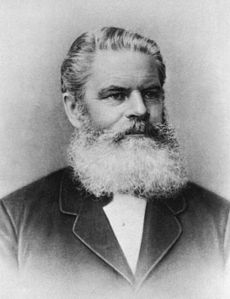
Hermann Rudolph Aubert
Academic
1826 – 1892
Who was Hermann Rudolph Aubert?
Hermann Rudolph Aubert was a German physiologist born in Frankfurt.
In 1850 he obtained his medical doctorate, afterwards serving as privat-docent of physiology at Breslau. In 1862 he became an associate professor, later being appointed professor of physiology at the University of Rostock.
Aubert is known for his research involving psychophysics, including the way an observer perceives pattern, movement and orientation. He conducted several experiments involving the phenomenon of dark adaptation; namely the eye's ability to regain its sensitivity in the dark after it had been exposed to bright lights.
With ophthalmologist Richard Förster, he performed a series of tests on vision outside the point of fixation, which they referred to as indirect vision. Their findings were published in a treatise called Beiträge zur Kenntniss des indirecten Sehens. From their work the eponymous "Aubert-Förster law" is derived. Aubert and Förster's data showed that visual acuity changes between central and peripheral vision in an approximately linear fashion with the visual angle of eccentricity. Another eponym associated with him is "Aubert's phenonemon", an optical illusion involving the factual position of a subjective vertical line when an observer's head is tilted. This phenomenon is particularly evident in the dark.
We need you!
Help us build the largest biographies collection on the web!
Citation
Use the citation below to add to a bibliography:
Style:MLAChicagoAPA
"Hermann Rudolph Aubert." Biographies.net. STANDS4 LLC, 2024. Web. 9 May 2024. <https://www.biographies.net/people/en/hermann_rudolph_aubert>.

Discuss this Hermann Rudolph Aubert biography with the community:
Report Comment
We're doing our best to make sure our content is useful, accurate and safe.
If by any chance you spot an inappropriate comment while navigating through our website please use this form to let us know, and we'll take care of it shortly.
Attachment
You need to be logged in to favorite.
Log In